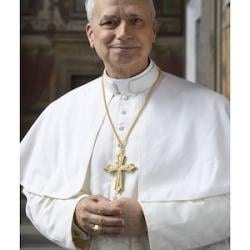
Don’t misunderstand why I have come. I did not come to abolish the law of Moses or the writings of the prophets. I came to accomplish their purpose. Jesus Christ
Jesus Christ did not cancel the Law and the Prophets of the Old Covenant. He fulfilled them.
The old law called for atonement through repeated blood sacrifice. Mary and Joseph engaged in blood sacrifice when they offered two turtledoves at the Temple as ransom for Jesus.
Notice what I said. They “ransomed” Jesus.
Before God intervened in history through Abraham and the Chosen People, human beings had fallen into the practice of offering up their own children to their false gods.
People knew instinctively that their relationship with their Creator was broken and that they were unable to heal the break. They understood that sin and death were linked.
They couldn’t go up to God, so they tried to bring God down to themselves. They fashioned little gods of stone and bowed down before them. They sought some massive something that would atone for the sinfulness that was hard-baked into them from before they were conceived. The greatest power they had was their own life-giving force. The most precious offering they could make was their own first born. The devil and his temptings did the rest.
Human sacrifice, once it took hold, had a hard grasp on people. It still does. Look around our world. Look at the abortion clinics, euthanasia clinics, wars, human trafficking, persecutions, porn, rapes, murders, the children in cages on the border. Look and see our human sacrifice to false gods.
The God of Abraham taught from the beginning that He did not want and would not abide human sacrifice. He made this clear when he sent Abraham into the desert to sacrifice his son Isaac, then intervened and stopped it.
It was even more clear in later Scripture which spoke of human sacrifice, of putting children “through the fire”as anathema. God punished the Israelites severely when they fell into the sin of human sacrifice.
The Old Covenant Law did not attempt to abolish the practice of sacrifice to propitiate God’s anger over human sin. After all, the desire to make such sacrifice was, however flawed the application, based on the intuitive understanding that the Way to God was closed by our sinful nature. There was a price in life blood that had to be paid to redeem our lives from death.
The Old Covenant substituted animal sacrifice for the sacrifice of human beings. It required parents to offer a blood sacrifice of an animal when they had their first-born child. The sacrifice “ransomed” the child from being put through the sacrificial fires. It was, like all the Temple sacrifices, a substitutionary measure to spare human life.
When Mary and Joseph took the infant Jesus to the Temple and offered a sacrifice of two turtledoves, they were honoring this ancient ritual sacrifice to ransom their first born from the fires. It was an act of propitiation that the child Himself would bring to an end 33 years later by offering Himself as the final and complete blood sacrifice for all sin, everywhere.
Jesus did not destroy the Law of the Old Covenant. He fulfilled it with His life’s blood and completed it with the Beatitudes. He did not undo the teachings of the Prophets. He fulfilled them with His incarnation, death, and resurrection, and completed them with the Sermon on the Mount.
He gave Himself as the final, perfect sacrifice. By doing that, He ended blood sacrifice and opened another Way for us to stand justified before God.
Jesus cancelled the old Law of an eye for an eye, a life for a life and gave us the New Covenant of Love. He not only fulfilled the Old Covenant Law with its demands for repeated and incomplete propitiation for our sinful natures, He gave us a New Covenant of Love and a new Law.
If you want to fight monsters and not become a monster yourself, you must obey the Sermon on the Mount and live the Beatitudes. Those Scriptures contain the entirety of the New Law. Everything else we know or believe about what God expects of us is an extrapolation on them.
The Gospels relate more than one instance of Jesus’ preaching the Sermon on the Mount. I think this is because He taught it many times, in different locations.
This was long before the printing press, cell phones or the internet. The only mass communication was the spoken word. If something needed to be heard by people in different places, it had to be said many times.
The Gospel witness is that Jesus taught the Sermon on the Mount and the Beatitudes at least several times. The authors of the Gospels just told the truth of what happened without explaining or trying to make things match up.
Matthew describes Jesus teaching from a hillside or mountain. There were large crowds following Him. He saw all these people, and climbed up the hillside, probably so they could see and hear Him. His disciples followed Him. Then He began to teach.
“Blessed are the poor in spirit,” he said. “Blessed are those who mourn, blessed are the meek, blessed are those who hunger and thirst for righteousness, blessed are the merciful, blessed are the pure in heart, blessed are the peacemakers, blessed are the persecuted.”
Jesus was speaking to people who had grown up hearing that God favored the rough and ready justice of “an eye for an eye, tooth for a tooth, life for a life.” These were people who stoned women for committing adultery and slaughtered animals to pay for their sins.
Jesus told them that people who almost anyone would think was cursed were the ones who were blessed. He overturned their — and our — understanding of what matters, and who is important. To be blessed by God is something far different from being blessed by the world. Jesus made that clear.
Instead of laughing at Him, the people absorbed what He said like dry ground sucking down a drop of water. They weren’t like us. They weren’t victims of excess who battled to lose weight and sought ways to get more exercise.
They were hungry a lot of the time, worn and exhausted by hard physical labor and beaten down by taxes that took most of what little they made. They were a defeated people in a vassal state ruled by an uncaring empire. Any passing Roman soldier could press them into labor at any time. Their lives were cheap and easily forfeit.
Jesus’ words about the poor, meek, mournful and persecuted made sense to them in the same way they have made sense to the poor and disenfranchised all over the globe for the past 2,000 years. At the same time, those words, which were balm for some, challenged and frightened the rich and powerful.
There were those like Matthew the tax collector, who got up and left his wealth-making sinecure and followed Jesus. But most of those in power sought to destroy Jesus. They wanted Him discredited into silence and obscurity. Failing that, they wanted Him dead.
The Beatitudes take the “Thou Shalt Nots” of the Ten Commandments and turn them around into “Thou Shalts.” The Old Covenant told us what not to do. The New Covenant tells us what we must do.
We’ll go into the Thou Shalts in depth Monday in Part Five
Note: I am not a theologian or Bible scholar. I am a pew-sitting, Jesus-loving, Bible-believing, pro life Catholic grandma. Nothing more. These are my reflections. They come from prayer and my own sufferings and walk with Christ.













